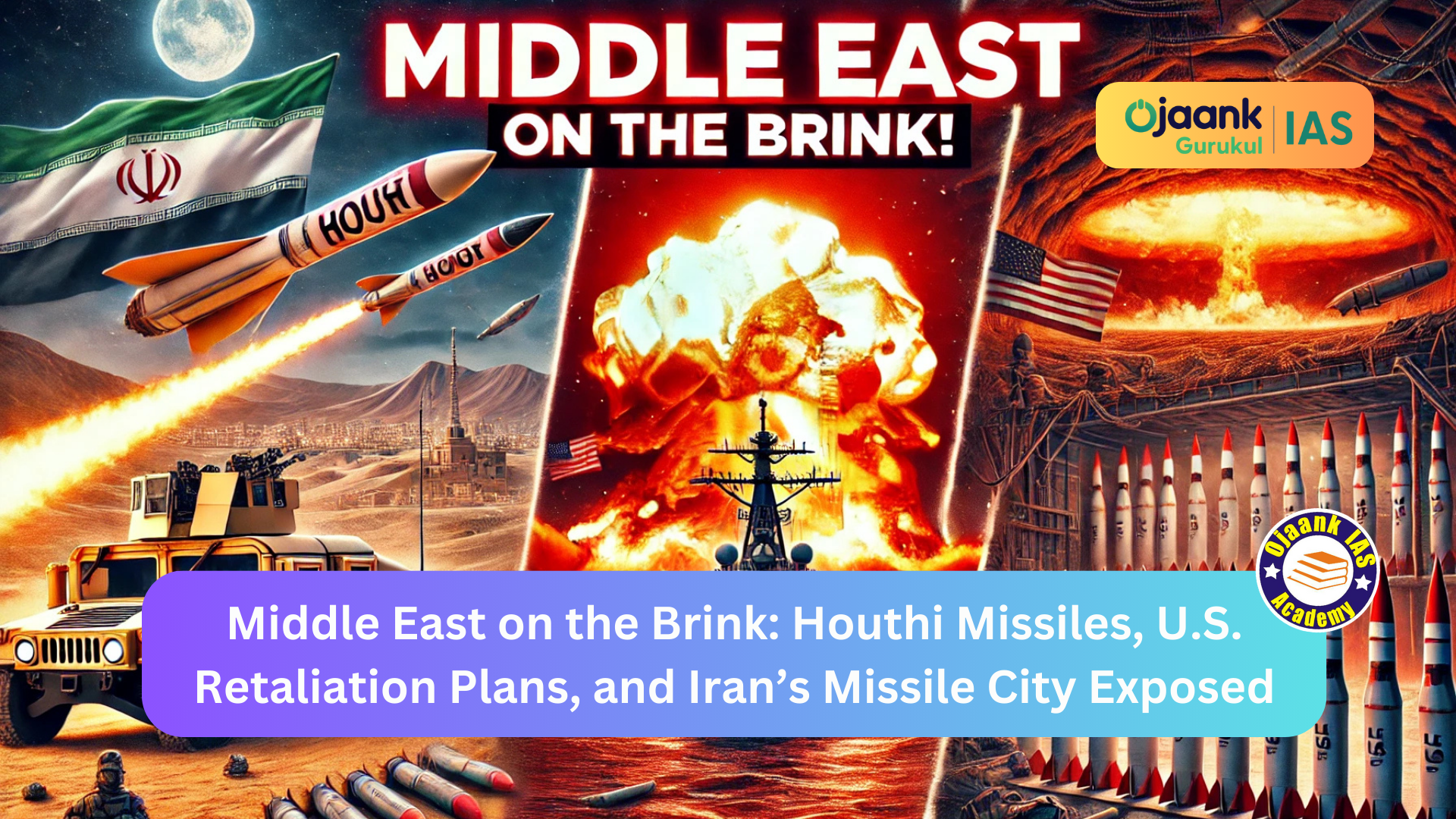Middle East on the Brink: Houthi Missiles, U.S. Retaliation Plans, and Iran’s Missile City Exposed

 Outline:
Outline:
-
Introduction
-
Breaking News: Missiles Launched at Israel and U.S. Warships
-
Who Are the Houthis and Why Are They Targeting Israel?
-
Israel’s Missile Defense and Rumors of Retaliation
-
Iran’s Strategic Backing and Regional Implications
-
The U.S. Response: Diego Garcia Comes into Play
-
What Makes the B-2 Stealth Bomber So Dangerous?
-
Iran’s Missile City: Power or Vulnerability?
-
Are We Heading Toward a Regional War?
-
What It Means for the World and India
-
Conclusion and Call to Action
 The Middle East Is Heating Up: Are We on the Edge of War?
The Middle East Is Heating Up: Are We on the Edge of War?
In today’s world-shaking development, missiles are flying, countries are flexing their military might, and the global community is holding its breath. Tensions in the Middle East have reached a boiling point, with the Houthis in Yemen launching direct attacks on Israel and U.S. naval forces in the Red Sea.
This isn’t just a local skirmish — this could be the start of a larger, deadlier conflict that may pull multiple nations into war. Let’s break down the situation.
 Breaking News: Houthis Launch Missiles at Israel and U.S. Targets
Breaking News: Houthis Launch Missiles at Israel and U.S. Targets
Early this morning, Iran-backed Houthi rebels fired missiles aimed at Ben Gurion Airport in Israel and a U.S. aircraft carrier stationed in the Red Sea. Though Israel's cutting-edge air defense systems intercepted the projectiles, the attack has sent shockwaves through global defense communities.
What makes this more than just a rogue missile strike? The Houthis claim it's retaliation for Israel’s operations in Gaza, and they’ve vowed more to come.
🌐 Learn More: Timeline of Houthi Attacks in the Red Sea – Al Jazeera’s detailed timeline of recent Houthi attacks in the region.
 Who Are the Houthis and Why Are They Targeting Israel?
Who Are the Houthis and Why Are They Targeting Israel?
The Houthi rebels are a militant group embroiled in Yemen's civil war. With financial and military support from Iran, they’ve expanded their battlefield — and ambitions.
By targeting Israel and U.S. forces, the Houthis are sending a clear message: they see themselves as part of a larger axis fighting against Western influence in the Middle East.
🌐 Read: Houthi-Iran Connection Explained – Reuters analysis on how Iran supports and funds the Houthis in Yemen.
 Israel’s Iron Dome Responds — But What Comes Next?
Israel’s Iron Dome Responds — But What Comes Next?
Israel didn’t just block the incoming missiles. According to inside sources, they’re preparing a counteroffensive aimed at Houthi targets in Yemen. Military jets are on standby, and a retaliatory strike may be imminent.
This isn’t a tit-for-tat anymore. This is a strategic battle over airspace, sea routes, and global influence.
🌐 Learn More: Israel's Retaliation Strategies – Haaretz coverage of Israel’s military response plans in Gaza and Yemen.
 Iran’s Role: A Silent Commander Behind the Scenes
Iran’s Role: A Silent Commander Behind the Scenes
Make no mistake — Iran is the mastermind behind this regional escalation. Experts say that if Israel intensifies operations in Gaza or retaliates strongly against Yemen, Iran could unleash its own wave of missiles.
They’ve already begun psychological warfare, recently releasing videos of “Missile City” — a vast underground base holding thousands of missiles, ready to fire at any moment.
🌐 Read: Iran's Military Influence in the Middle East – Brookings Institution report on Iran’s military influence across the region.
 U.S. Military Moves: All Eyes on Diego Garcia
U.S. Military Moves: All Eyes on Diego Garcia
The United States isn’t just watching from the sidelines. While the Houthis targeted its aircraft carriers, the real strategic shift is happening on the island of Diego Garcia, a highly classified U.S. military base in the Indian Ocean.
New intelligence reveals that B-2 stealth bombers and long-range missiles are being deployed to the island. This is not a drill — it’s a show of force meant to tell Iran and its allies:
“We’re watching. We’re ready.”
 What Is a B-2 Stealth Bomber — and Why Is It Terrifying?
What Is a B-2 Stealth Bomber — and Why Is It Terrifying?
The B-2 stealth bomber is the crown jewel of the U.S. Air Force. It can:
-
Fly undetected deep into enemy territory
-
Drop heavy payloads with pinpoint accuracy
-
Evade radar and anti-aircraft defense systems
Its deployment to Diego Garcia signals that the U.S. is preparing for long-range offensive strikes — and Iran is likely the primary target.
 Iran’s Missile City: A Power Move with a Fatal Flaw?
Iran’s Missile City: A Power Move with a Fatal Flaw?
Iran's video of Missile City may be intended to intimidate, but military analysts spotted a dangerous vulnerability. The missiles are stored in extremely tight quarters. A single airstrike — if accurate — could trigger a catastrophic chain explosion, wiping out the entire facility.
So why reveal it? Perhaps it’s psychological posturing. But in doing so, Iran may have exposed a fatal weakness.
 Regional War Incoming? The Signs Are Alarming
Regional War Incoming? The Signs Are Alarming
With the Houthis firing missiles, Israel preparing to strike, Iran showcasing its arsenal, and the U.S. quietly positioning deadly bombers — all signs point to the possibility of a broader regional conflict.
-
If Iran enters directly, expect missile warfare across multiple countries.
-
If Israel hits back hard in Yemen, the Red Sea could become a warzone.
-
And if the U.S. retaliates, Diego Garcia could become the epicenter of a modern war campaign.
🌐 Read: Potential for Middle East War Escalation – The Guardian coverage of escalating tensions and possible scenarios for regional war.
 What This Means for India and the World
What This Means for India and the World
So far, India remains neutral and safe. But if war breaks out:
-
Oil prices could skyrocket, impacting the Indian economy.
-
Global supply chains may be disrupted, especially through the Red Sea.
-
India may face strategic dilemmas if allies are drawn into the conflict.
Right now, peace is holding — barely. But one wrong move could ignite a regional firestorm with global consequences.
🌐 Read: India’s Geopolitical Concerns Amid Middle East Tensions – The Hindu analysis of how regional instability could impact India’s economy and diplomatic relations.
 Conclusion: Are We at the Edge of World War or Just More Posturing?
Conclusion: Are We at the Edge of World War or Just More Posturing?
Missiles over the Red Sea. Covert military buildup. Nuclear-capable bombers on standby.
This isn’t just saber-rattling anymore — it’s a real-time chess match between Iran, Israel, the U.S., and its proxies. And the board is heating up.
For now, the world watches. But the next missile could change everything.
 What Do You Think?
What Do You Think?
Do you believe this is just a temporary flare-up, or are we truly on the edge of a new war in the Middle East?
Drop your thoughts in the comments 
Share this post with someone who needs to understand what’s really happening behind the headlines.
Copyright 2022 power by Ojaank Ias





